
LEARNING ENVIRONMENTS RESEARCH
Scope & Guideline
Exploring the Dynamics of Learning Spaces
Introduction
Aims and Scopes
- Exploration of Learning Environments:
The journal emphasizes the investigation of physical, social, and psychological aspects of learning environments in various educational contexts, including K-12 and higher education. - Impact of Educational Innovations:
It focuses on how innovative pedagogical strategies, technologies, and learning spaces influence student engagement, motivation, and learning outcomes. - Student and Teacher Interactions:
Research on the dynamics of teacher-student relationships and peer interactions is a core area, examining how these relationships affect the learning experience. - Assessment and Measurement:
The journal publishes studies that develop and validate tools for measuring perceptions of learning environments, including classroom climate, school climate, and instructional quality. - Cultural and Contextual Factors:
It addresses the influence of cultural and contextual factors on learning, including how these elements shape educational experiences and outcomes. - Mental Health and Well-being:
There is a focus on understanding the role of learning environments in supporting student mental health and well-being, particularly in the context of challenges such as the COVID-19 pandemic.
Trending and Emerging
- Hybrid and Online Learning Models:
There is a notable increase in studies addressing hybrid and online learning environments, especially in response to the COVID-19 pandemic, highlighting the need for effective strategies in these settings. - Flexible Learning Spaces:
Research on the design and implementation of flexible learning spaces is trending, with a focus on how physical environments can enhance learning experiences and engagement. - Mental Health and Well-being in Education:
Emerging themes include the examination of mental health and well-being in educational contexts, particularly how learning environments can support students' emotional and psychological needs. - Culturally Responsive Pedagogy:
There is a growing emphasis on culturally responsive learning environments that recognize and address diversity, equity, and inclusion in educational practices. - Technology Integration in Learning:
The integration of technology in learning environments is increasingly being explored, with research focusing on its impact on engagement, communication, and collaboration among students. - Social-Emotional Learning:
Research on social-emotional learning (SEL) within various educational environments is becoming more prominent, emphasizing the importance of emotional intelligence alongside academic achievement.
Declining or Waning
- Traditional Classroom Settings:
Research specifically centered on conventional classroom settings has decreased, as the journal increasingly prioritizes studies on innovative and flexible learning environments. - Single-Dimensional Learning Environments:
There is a waning emphasis on studies that consider learning environments in isolation, with a growing preference for multi-dimensional analyses that incorporate various influencing factors. - Static vs. Dynamic Learning Environments:
Themes exploring static learning environments without considering their evolution or adaptability in response to pedagogical changes have become less prevalent. - Teacher-Centric Approaches:
Research focusing predominantly on teacher-centered pedagogies is declining, as the journal shifts towards more collaborative and student-centered learning models.
Similar Journals

Bulletin of the Technical Committee on Learning Technology
Exploring the Intersection of Education and TechnologyBulletin of the Technical Committee on Learning Technology, published by IEEE-INST ELECTRICAL ELECTRONICS ENGINEERS INC, is a pivotal journal that intersects the realms of education and computer science. With a noteworthy ISSN of 2306-0212, this journal serves as a vital platform for disseminating innovative research and development in learning technologies, particularly focusing on technological advancements that enhance educational environments and methodologies. Although coverage in Scopus has been discontinued, the journal's past contributions are reflected in its competitive rankings, with a position of Rank #624 in Social Sciences - Education and Rank #427 in Computer Science - Computer Science Applications. This indicates a solid niche in the academic landscape, making it a valuable resource for researchers, educators, and practitioners seeking to advance the dialogue around technology integration in learning. The Bulletin fosters an open exchange of knowledge and encourages the exploration of emerging technology applications in education, positioning itself as an important component in the ongoing development of learning technologies.
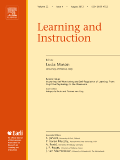
LEARNING AND INSTRUCTION
Unlocking the Secrets of Learning and InstructionWelcome to the esteemed LEARNING AND INSTRUCTION journal, a pivotal publication in the fields of educational science and developmental psychology, published by PERGAMON-ELSEVIER SCIENCE LTD. With a remarkable Impact Factor reflective of its quality (ranking in Q1 across its categories), this journal serves as a crucial platform for disseminating research that transforms the understanding of learning processes and instructional methodologies. Since its inception in 1991 and extending through 2024, LEARNING AND INSTRUCTION has consistently provided insights crucial for educators, researchers, and students alike, positioning itself among the top journals in both the Social Sciences - Education and Psychology - Developmental and Educational Psychology categories. Its rigorous peer-review process ensures that only the most impactful research reaches its readers, making it a must-read for anyone engaged in the enhancement of educational practices and learner outcomes. While it operates on a subscription model, the knowledge gained through its pages is invaluable for shaping the future of education.

Social Psychology of Education
Exploring the dynamics of learning through a social psychological lens.Social Psychology of Education is a prestigious academic journal published by Springer, dedicated to advancing the understanding of social psychological processes within educational contexts. With an ISSN of 1381-2890 and an E-ISSN of 1573-1928, this journal has established its prominence in the field, evidenced by its Q1 rankings in multiple categories, including Developmental and Educational Psychology, Education, Social Psychology, and Sociology and Political Science for 2023. It ranks within the top percentiles of Scopus listings, reflecting its influential impact on the research community. Spanning from its inception in 1996 to the present, this journal aims to publish high-quality, empirical, and theoretical studies that explore the intersection of social psychology and education, fostering a deeper understanding of how social factors affect learning environments and educational outcomes. Although it does not currently offer open access, researchers, professionals, and students leverage its findings to inform practice and policy-making in educational settings. Located in Dordrecht, Netherlands, the journal continues to be a vital resource for those interested in educational psychology and sociological perspectives on learning.

Journal of Psychological and Educational Research
Uncovering Contemporary Issues in Psychology and EducationJournal of Psychological and Educational Research, published by EDITURA UNIV ORADEA, serves as a crucial platform for the dissemination of scholarly work in the domains of psychology and education. With a strong focus on applied psychology, developmental psychology, and educational psychology, this journal provides a vital resource for researchers, practitioners, and students keen on exploring contemporary issues and advancements in these fields. Though it operates under a Q4 category in Applied Psychology and Developmental and Educational Psychology, it holds a respectable Q3 ranking in Education as of 2023, reflecting its growing influence amid an evolving academic landscape. The journal is open to diverse methodologies and perspectives, fostering interdisciplinary collaboration and innovation. With its archival span from 2011 to 2024, this journal not only enhances academic discourse but also contributes meaningful insights relevant to personal and educational development. Engage with the Journal of Psychological and Educational Research to stay at the forefront of research that shapes today and tomorrow in psychology and education.

E-Learning and Digital Media
Transforming education through digital innovation.E-Learning and Digital Media, published by SAGE Publications Inc, is a premier academic journal dedicated to the innovative intersection of digital technologies and education. With a strong commitment to advancing research in the fields of education and computer science, this journal has established itself as a vital resource for researchers, professionals, and students alike. As of 2023, it proudly holds a Q2 ranking in both Computer Science Applications and Education, reflecting its impact and reach within the academic community. The journal encompasses a wide range of topics exploring the effectiveness and applications of e-learning technologies, pedagogical strategies, and digital media in educational settings. Since its inception in 2009, E-Learning and Digital Media has continuously contributed to the understanding and development of digital education, ensuring relevancy in an ever-evolving landscape. With an open access model intended to foster accessibility and dissemination of knowledge, this journal invites submissions that push the boundaries of traditional education through cutting-edge research and practice.
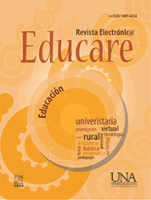
Revista Electronica Educare
Fostering Global Conversations in Educational Innovation.Revista Electronica Educare, published by UNIV NACL, CIDE in Costa Rica, stands as a vital resource in the field of education, contributing significantly to the discourse since its inception in 2001. As an Open Access journal, it promotes the dissemination of educational research globally, ensuring that valuable findings are accessible to a wider audience without financial barriers. With an increasing impact factor reflected in its current categorization in the Q3 quartile for education sciences and a Scopus rank of #989 among 1543 in Social Sciences, the journal is recognized for its quality and relevance in contemporary educational studies. The journal covers a broad spectrum of topics within the educational landscape until 2024, making it an essential platform for researchers, professionals, and students eager to explore innovative pedagogical practices and share their insights with the academic community. As it continues to evolve and flourish, Revista Electronica Educare invites contributors and readers alike to engage with the cutting-edge of educational research.
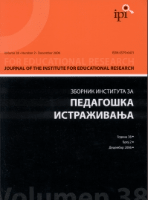
Zbornik Instituta za Pedagoska Istrazivanja
Exploring New Frontiers in Pedagogical TheoryZbornik Instituta za Pedagoska Istrazivanja, an esteemed journal based in Serbia, serves as a crucial platform for scholarly work in the field of Education. Published by the Institute for Educational Research, this Open Access journal has been committed to disseminating innovative research since 2002, providing a vital resource for educators, researchers, and students alike. With the latest ranking placing it in the Q3 category for Education in 2023, and a Scopus ranking at #1342 out of 1543 in the Social Sciences Education category, the journal demonstrates its potential for impactful contributions to educational theories and practices. The journal's commitment to advancing pedagogy and fostering educational improvement makes it an essential addition to any academic library and offers valuable insights that engage the global education community. Access its wealth of knowledge at [Zbornik Instituta za Pedagoska Istrazivanja](https://examplelink.com), and join the ongoing dialogue shaping the future of education.
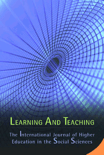
Learning and Teaching-The International Journal of Higher Education in the Social Sciences
Connecting Theory and Practice in the Social SciencesLearning and Teaching: The International Journal of Higher Education in the Social Sciences, published by BERGHAHN JOURNALS, stands at the forefront of interdisciplinary scholarship dedicated to enhancing the pedagogical landscape within the social sciences. With its Open Access model established in 2020, this journal provides a vital platform for disseminating innovative research and best practices that contribute to the evolving dynamics of higher education. Operating from the United States, and noted for its relevance in Developmental and Educational Psychology, Education, and Sociology and Political Science, Learning and Teaching has achieved commendable rankings, positing it in the Q3 and Q2 quartiles in several categories as of 2023. This recognition underscores its importance as a resource for researchers, educators, and students alike, fostering a robust dialogue about teaching strategies, learning environments, and educational theories. By converging research and practice from 2017 to 2024, Learning and Teaching is poised to influence the future of education, preparing scholarly contributors to address the complexities of learning in the social sciences effectively.
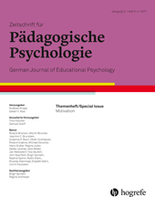
ZEITSCHRIFT FUR PADAGOGISCHE PSYCHOLOGIE
Where psychology meets pedagogy for transformative learning.ZEITSCHRIFT FUR PADAGOGISCHE PSYCHOLOGIE, published by HOGREFE AG, is a vital resource in the field of Developmental and Educational Psychology, focusing on the interplay between psychological principles and educational practices. With an ISSN of 1010-0652 and an E-ISSN of 1664-2910, this esteemed journal has been at the forefront of academic dialogue since its inception in 1996 and continues to contribute significantly to the discipline through 2024. It holds a respectable Q3 ranking within its category, highlighted by its position in the 57th percentile among developmental and educational psychology journals in Scopus. Although it is not an Open Access journal, it remains highly regarded for its comprehensive coverage of empirical research, theoretical contributions, and practical implications relevant to educators and psychologists alike. This journal not only fosters the advancement of research but also provides actionable insights that inform effective educational strategies, making it an essential read for scholars, practitioners, and students eager to engage with the latest findings in pedagogical psychology.
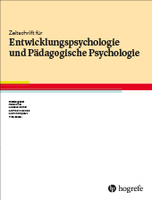
ZEITSCHRIFT FUR ENTWICKLUNGSPSYCHOLOGIE UND PADAGOGISCHE PSYCHOLOGIE
Innovating Insights for Developmental and Educational SuccessZEITSCHRIFT FUR ENTWICKLUNGSPSYCHOLOGIE UND PADAGOGISCHE PSYCHOLOGIE, published by HOGREFE VERLAG, is a pivotal academic journal based in Germany that focuses on the intricate fields of developmental and educational psychology. With an emphasis on innovative research and the latest theoretical developments, this journal aims to bridge the gap between psychological theory and educational practice. It holds a commendable Q3 ranking in Developmental and Educational Psychology and an impressive Q2 ranking in the broader field of Education, underscoring its relevance and contribution to the academic discourse. Although it does not currently offer Open Access options, the journal continues to provide substantial insights and findings that are crucial for researchers, educators, and students alike, thereby fostering advancements in both psychological research and educational methodologies. Spanning topics from childhood development to pedagogical strategies, this journal serves as an essential platform for disseminating knowledge within these interconnected fields.